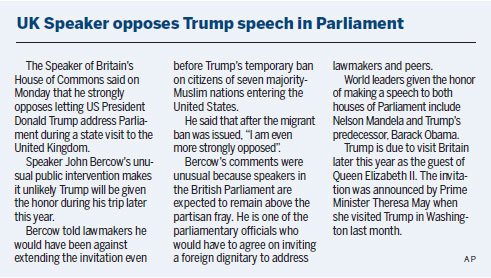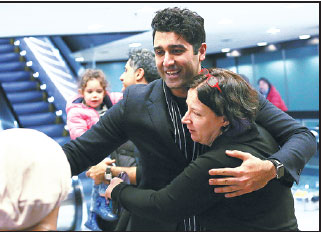US govt defends 'lawful' travel ban
Trump: 'Dishonest' media 'doesn't want to report' extremist attacks
The US government on Monday defended President Donald Trump's travel ban as a "lawful exercise" of his authority, and urged an appeals court to reinstate the suspended measure in the interests of national security.
Three days after a federal judge put the controversial measure on hold, Justice Department lawyers filed a court brief challenging the nationwide injunction as "vastly overbroad".
|
Iranian citizen and US green card holder Cyrus Khosravi (center) hugs volunteer lawyers at Seattle-Tacoma International Airport in Washington on Monday.David Ryder / Reuters |
An hour-long telephone hearing has been set for Tuesday at 3 pm in a high-stakes case that looks increasingly likely to be settled by the Supreme Court.
Two new polls show a majority of US citizens now oppose the travel ban on refugees and travelers from seven mostly-Muslim nations, which prompted airport chaos and condemnation around the world - but Trump has shown no sign of bending, pushing back late on Monday in a new Twitter salvo.
"The threat from radical Islamic terrorism is very real, just look at what is happening in Europe and the Middle East. Courts must act fast!" he said.
Court 'erred'
Earlier in the day, during a visit to US Central Command in Tampa, Florida, Trump accused the media of downplaying the terror threat that his administration cites to justify its ban, saying they purposefully ignored jihadist atrocities.
"All over Europe, it's happening. It's gotten to a point where it's not even being reported," he told a group of about 300 US troops at MacDill Air Force Base in Florida.
"And, in many cases, the very, very dishonest press doesn't want to report it. They have their reasons, and you understand that," he added, without saying what those reasons were.
The White House later released a list of 78 attacks around the world from September 2014 to December 2016.
Trump's decree summarily denied entry to all refugees for 120 days, and travelers from Iran, Iraq, Libya, Somalia, Sudan, Syria and Yemen for 90 days - a move critics charge will damage US interests. Refugees from Syria were blocked indefinitely.
The president said the ban is needed to tighten US security against foreign terror threats, citing the Sept 11, 2001, attacks despite the hijackers having no links to the named countries.
In its filing to the Ninth Circuit Court of Appeals in San Francisco, the government argued that the federal court that temporarily rolled back Trump's directive had "erred in entering an injunction barring enforcement of the order," asking that the ban be reinstated.
The Justice Department argued that "the executive order is a lawful exercise of the president's authority over the entry of aliens into the United States and the admission of refugees".
"Even if some relief were appropriate, the court's sweeping nationwide injunction is vastly overbroad," it said.
The government again denied that the order specifically targets Muslims, defending it as a means of reviewing and revising screening procedures in order to "protect against terrorist attacks."
And it said non-US citizens seeking to enter the US for the first time have no constitutional rights to be upheld.




















